Individuals, business entities, or trusts other than class 3 dealers or licensees must obtain permission from ATF prior to temporarily or permanently moving a machine-gun, short-barreled shotgun, short-barreled rifle, or destructive device interstate.
To obtain permission to move these firearms, you must submit either a letter requesting permission to move the item(s) or a Form 5320.20 to the ATF
If you are submitting the request by letter, please include the:
• Name of registrant;
• The firearm(s);
• The current location of the firearm(s);
• The location to which the firearm(s) will be transported;
• The date(s) and means of transportation (car, plane, boat, etc.); and
• The reason the firearm is being moved.




